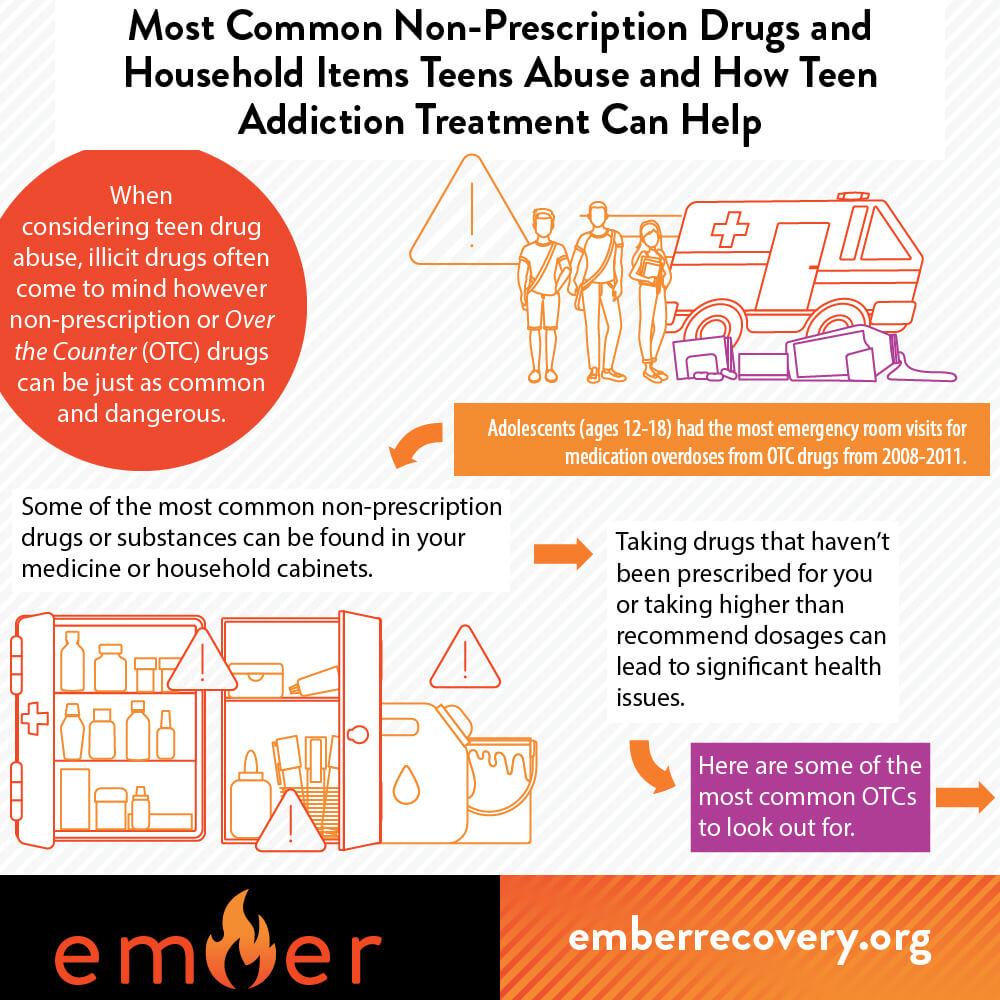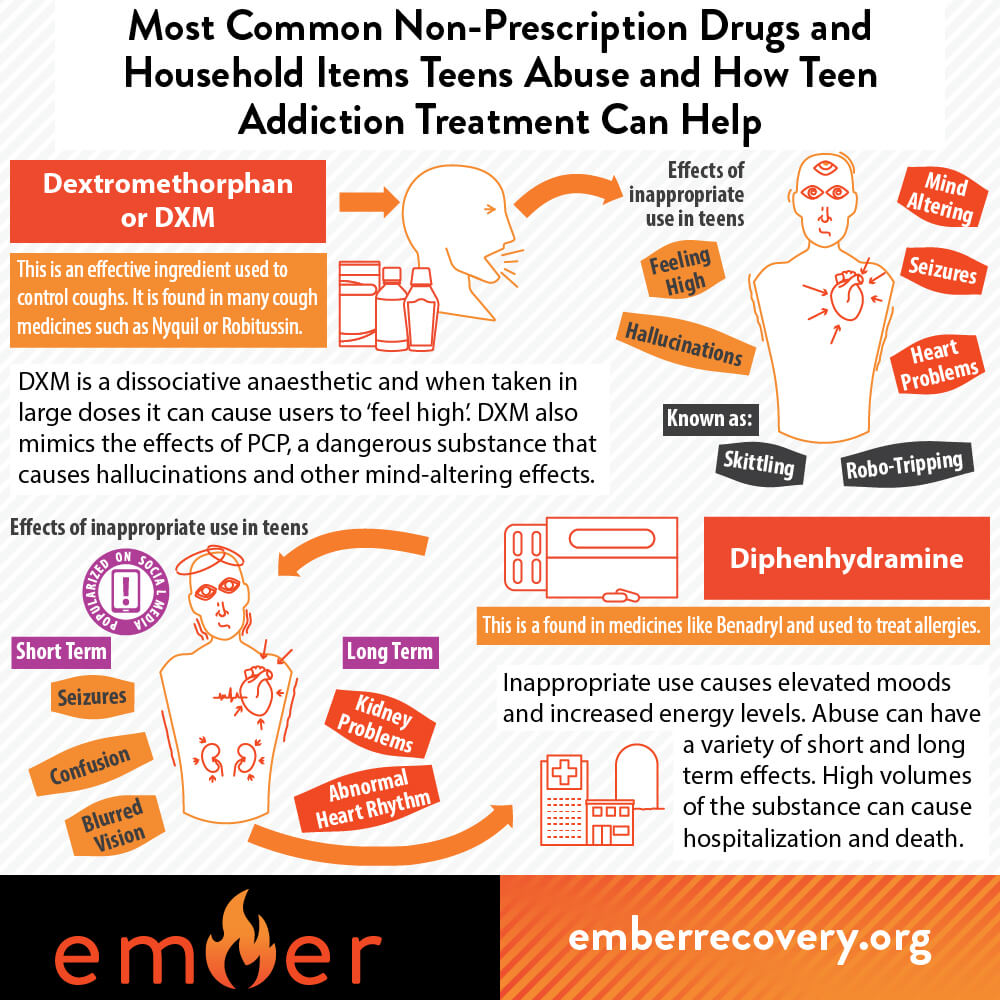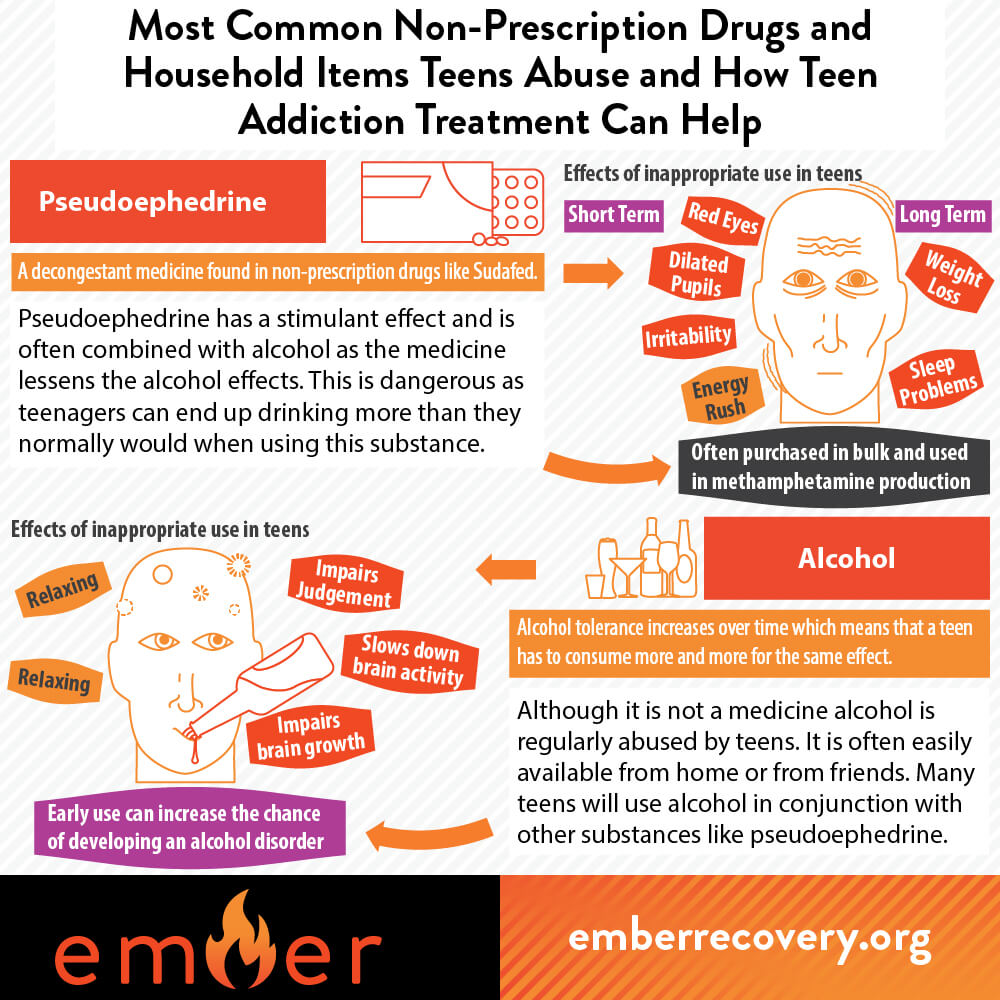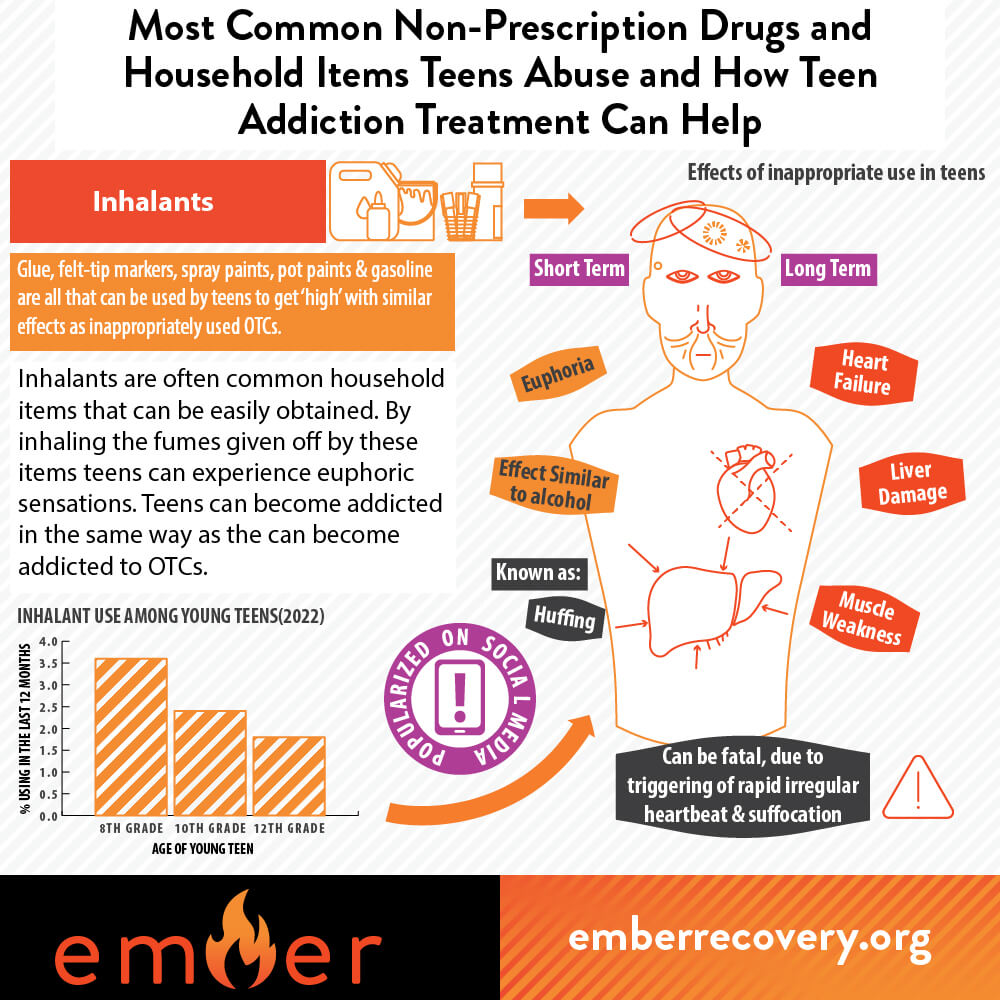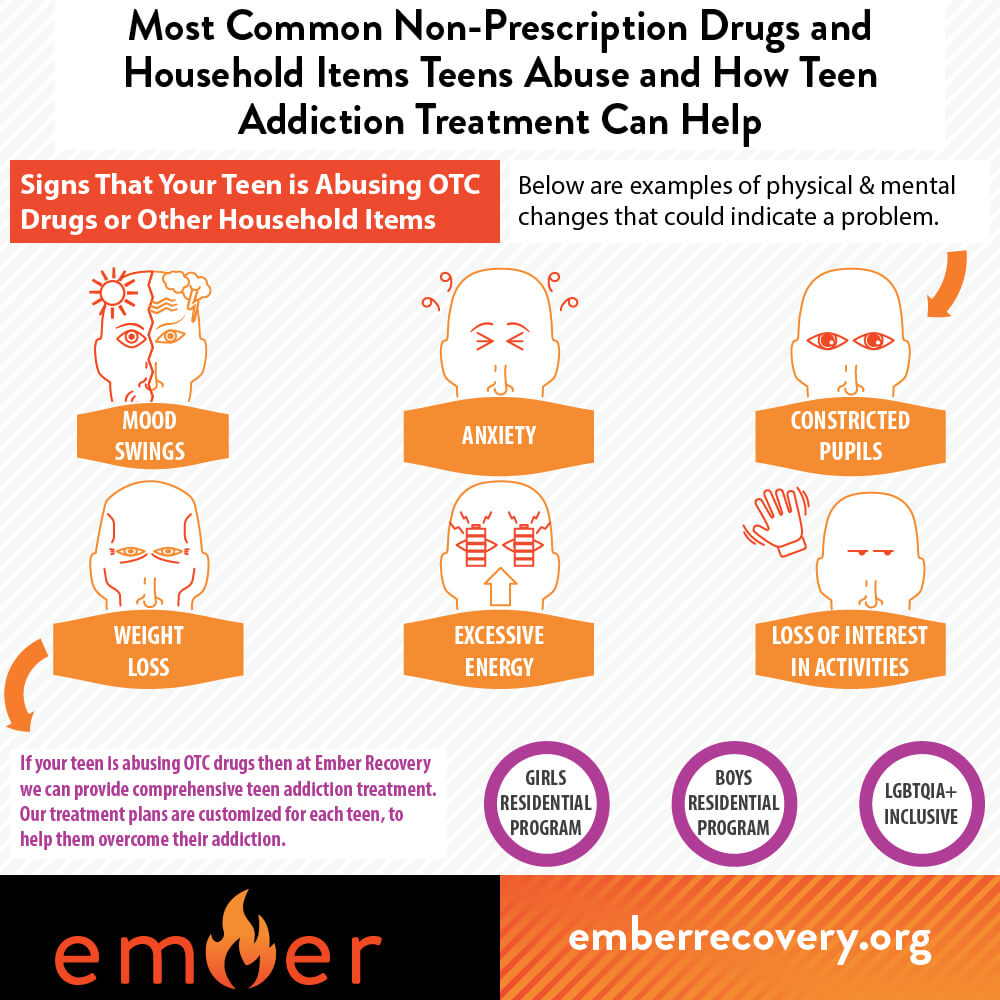When you think about teen drug abuse, illegal drugs probably come to mind. But non-prescription drugs can be just as prevalent and dangerous. Statistics show adolescents ages 12-18 had the most emergency room visits for medication overdoses from over-the-counter (OTC) drugs. 1 This is because teens don’t understand the risks of abusing these drugs. We’ll examine the most common non-prescription drugs and household items among teens and the dangers of abusing them. We’ll also discuss how teen addiction treatment at Ember Recovery can help teens overcome OTC drug abuse or the abuse of other household items.
Most Common Non-Prescription Drugs and Household Items Teens Abuse
Unfortunately, some of the most common non-prescription drugs or other household teens abuse are probably in your medicine or cleaning cabinet now. While you may not think they can become addictive or dangerous if used as prescribed, taking over the recommended amount or taking a drug that isn’t prescribed for that person can cause significant health problems.
Dextromethorphan or DXM
Dextromethorphan (DXM) is an ingredient used to control coughs. It is found in many OTC cold and cough medications such as Nyquil or Robitussin. 1 While it is extremely effective in treating colds and coughs when taken properly, teens gravitate towards it because it can make them feel high. Statistics show that 8th to 12th graders are the most likely group to abuse DXM. 2 Abusing DXM is often called “skittling” or “robo-tripping.”
DXM is a dissociative anesthetic that can cause hallucinations when taken in large doses. When DXM is abused, it can mimic the effects of PCP, which is a very dangerous hallucinogen. It can also produce mind-altering effects, heart problems, and seizures. 3 While many teens may drink large amounts of Nyquil to achieve the feeling, they may also turn to find DXM in larger quantities. DXM sells on the street under the names Skittles and Triple C.
Diphenhydramine
Diphenhydramine, more commonly found in Benadryl, is used to treat allergies. Taking it inappropriately can lead to increased energy levels and elevated mood. Teens who abuse diphenhydramine may do it to relieve stress and to feel high. Short-term effects of abusing this drug include confusion, seizures, and blurred vision. Long-term effects can lead to kidney problems and abnormal heart rhythm. Taking too much Benadryl can also cause hallucinations and can be lethal.
In 2020, the dangers of taking too much Benadryl were seen as a result of the TikTok “Benadryl Challenge,” which prompted children to take excessive amounts to get high. 4 A 15-year-old Oklahoma girl took the challenge and died. 5 Over the years, other teens have taken too many Benadryl pills and were hospitalized as a result.
Pseudoephedrine
Pseudoephedrine is a decongestant medicine found in non-prescription drugs like Sudafed. While it helps to relieve congestion, it can also produce stimulant-like effects, hypertension, and agitation. This drug is often bought in bulk and used as an ingredient to make methamphetamine by drug dealers.
Pseudoephedrine is known to give users an energy rush, so teens may be drawn to it. Many teens use it in combination with alcohol. Since the stimulating effects of pseudoephedrine can lessen the effects of alcohol, teens may drink more than they normally would, leading to dangerous consequences.
Short-term effects of pseudoephedrine abuse include irritability, dilated pupils, and red eyes. Long-term effects can include weight loss and sleeping problems.
Alcohol
While it is not a medication, many teens also abuse alcohol. Teens may be able to get it easily at home or through friends. As we mentioned above, some use it in connection with pseudoephedrine, while others use it alone. Drinking alcohol can make teens feel very relaxed and forget their problems, which can lead to alcohol abuse.
As teens continue to drink, they build up a tolerance, making them want more to achieve the same feeling. Teens may turn to alcohol due to peer pressure, issues at home, or as an escape mechanism. When teens abuse alcohol, it can impair their judgment and lead to dangerous consequences. Drinking too much can also impair brain development in teens and slow down brain activity. 6
Inhalants
Glue, felt-tip markers, spray paints, and gasoline are among the items that can also become addictive for teens when used as inhalants. Although all of these items are not drugs, they can form addictive qualities just as OTC drugs and illegal drugs can. Teens engage in “huffing” to get high and achieve the same effects of alcohol use. When teens begin to enjoy the feeling inhaling these items can bring, they want to do it more.
Statistics show that in 2022, an estimated 3.6% of 8th graders, 2.4% of 10th graders, and 1.8% of 12th graders reported using inhalants in the past 12 months.7 Social media challenges have also encouraged inhalant abuse, such as inhaling tanning sprays.
While teens may enjoy the euphoric feelings they receive from huffing, long-term inhalant use can lead to heart failure, liver damage, and muscle weakness. It can also be fatal because of triggering a rapid, irregular heartbeat as well as suffocation.
Signs That Your Teen is Abusing OTC Drugs or Other Household Items
Most teen abuse OTC drugs because they’re easy to get and don’t cost nearly as much as illegal drugs. Teens also wrongly assume these drugs are not as harmful as illicit ones until it’s too late.
If you suspect your teen is abusing OTC drugs, here are some signs to look for:
- Mood swings
- Constricted pupils
- Anxiety
- Weight loss
- Excessive energy
- Loss of interest in activities
When you begin to see these signs in your teen, seeking teen addiction treatment can help them get the help they need to stop abusing OTC drugs or other items to get high.
Teen Addiction Treatment at Ember Recovery
Ember Recovery is here to help teens with all types of drug addiction. We offer comprehensive teen addiction treatment to help teens who are battling non-prescription drug abuse. Our teen treatment programs include a girls’ residential program, and a boys’ residential program, and are LGBTQIA+ inclusive. We aim to help each teen get customized treatment to overcome their addiction.
For more information on how our programs can help your teen with their OTC drug addiction, call us today or contact us online. We have the necessary experience and resources to help your teen on their path to living a drug-free life.
Sources:
[1] https://www.ncbi.nlm.nih.gov/pmc/articles/PMC6302752/ [2] https://substanceabusepolicy.biomedcentral.com/articles/10.1186/s13011-016-0067-0 [3] https://www.aafp.org/pubs/afp/issues/2011/1001/p745.html [4] https://www.childrensmn.org/2020/10/09/parents-need-know-tiktok-benadryl-challenge/ [5] https://www.forbes.com/sites/victoriaforster/2020/09/02/teen-dies-after-doing–tiktok-benadryl-challengeas-doctors-warn-of-dangers/?sh=659a8249f0db [6] https://www.talkitoutnc.org/blogs/effects-alcohol-on-teens/ [7] https://nida.nih.gov/publications/research-reports/inhalants/what-scope-inhalant-abuse
Andrea Dickerson is a Licensed Therapist and Certified Substance Use Counselor who has worked in behavioral health since 1997. Currently, Andrea is the Director of Behavioral Health, overseeing the Ember residential treatment programs and YSS outpatient counseling clinics throughout Central and North Central Iowa. She became a Motivational Interviewing (MI) trainer in 2006 and provides MI trainings throughout Iowa.
Andrea specializes in working with adolescents and their families and enjoys seeing the family relationships grow through therapy. Andrea is also a CARF International Surveyor, going around North America ensuring behavioral health organizations are meeting required standards.
In her free time, Andrea enjoys cheering on the Iowa Hawkeyes and Chicago Cubs, as well as being an active member of Soroptimist International of the Americas (SIA), a global organization that provides women and girls with access to the education and training they need to achieve economic empowerment. She has been a member of the SI of Des Moines club since 2012 and has been actively involved at the regional level, currently serving as Co-Governor of the Peaks to Plains Region.
Through her involvement in SIA, Andrea has been actively involved in the Dream Programs, coordinating annual Dream It, Be It: Career Support for Girls projects, which give girls the tools they need to achieve their education and career goals, empowering them to break cycles of poverty, violence, and abuse.

